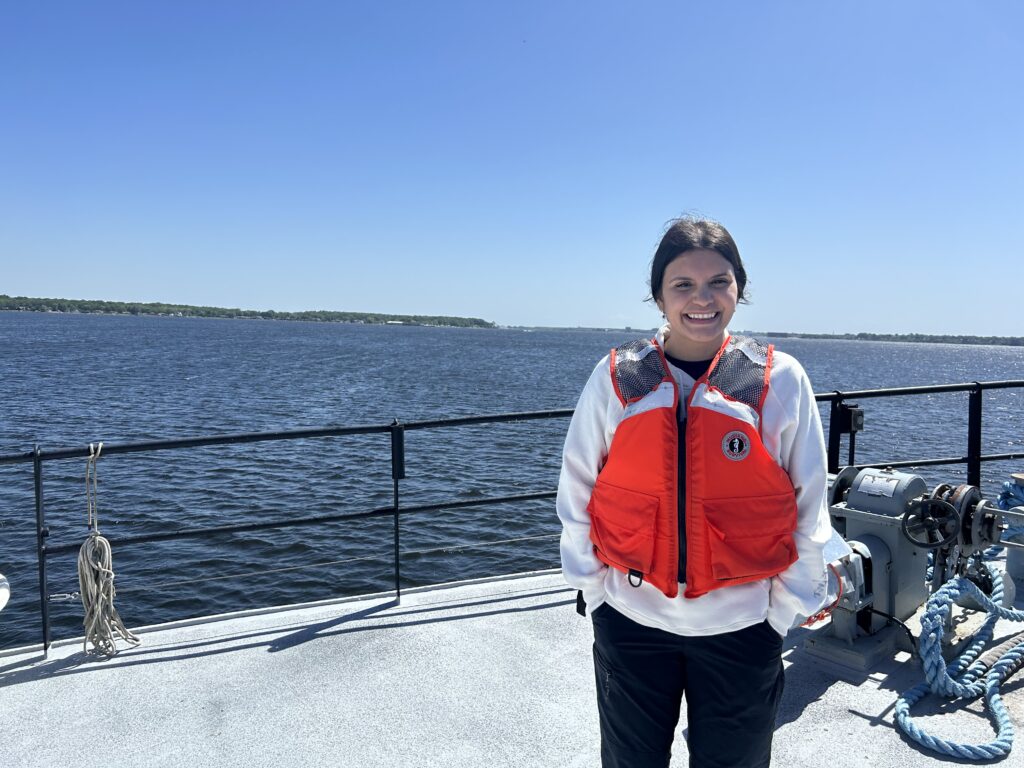Researcher Spotlight – Jamie Huerta

2024-25 Global Change Research Fellow
MS Student, Center for Geospatial Analytics
Advisor: Christopher Osburn
About You
What do you study?
I study Geospatial Information Science and Technology.
What influenced you to go into this field of study?
I’ve always had a strong interest in environmental and social justice issues, and I see geospatial science as a way to address both. I believe everyone deserves equitable access to environmental resources, and through mapping and data visualization, I can transform complex information into something that is accessible and meaningful.
What do you think is the most pressing issue related to global change?
I think the most pressing issue related to global change is the increasing frequency and severity of extreme weather events and their impacts. We’re seeing more wildfires, droughts, hurricanes, and heatwaves, all of which have serious impacts on communities and ecosystems. These events not only cause immediate damage, but they also lead to long-term consequences like economic strain, health issues, and displacement. As these extreme events become more common due to global change, they show the urgent need for both immediate response strategies and long-term solutions.
About Your Research

What results are you finding?
Throughout the project, we’ve observed fewer algal blooms than we initially expected over the timespan analyzed. However, we’ve successfully identified watersheds with higher nitrogen levels and traced nutrient sources, which provides valuable insight into nutrient flow and potential intervention points. This information is essential for understanding the dynamics of nutrient loading in these areas and developing strategies to prevent future blooms.
Who will benefit from your research?
Communities, environmental managers, and policymakers may benefit from my research. By identifying where extra nitrogen in the Albemarle Sound comes from, my work could help create strategies to reduce nutrient pollution. This can lead to cleaner, safer rivers for people who rely on these waters for recreation, drinking water, and fishing, while also protecting wildlife and ecosystems that depend on healthy water quality.
How would you describe your research to a 3rd grader?
My research focuses on understanding where the extra nutrients that fuel harmful algae blooms come from in the Albemarle Sound of North Carolina. Sometimes, this algae grows excessively, making the water unsafe for both people and animals. Algae requires a nutrient called nitrogen to thrive, and when there’s too much nitrogen—originating from sources like farms, cities, or natural areas—it can lead to uncontrolled growth. I use a statistical model to track the sources of this extra nitrogen, helping us find ways to keep our rivers clean and safe for everyone to enjoy.
About Your Global Change Research Fellow Experience
How do you expect the SE CASC Global Change Research Fellows Program to impact you and your work?
The SE CASC Global Change Research Fellows Program is helping to connect me with professionals in my field and expose me to valuable new experiences. By engaging with experts and participating in activities like helping to put on environmental workshops, I’m gaining new experiences that will enhance my ability to address environmental challenges and make a positive impact in my field.
What advice would you give to a student that is interested in getting involved in your field?
My advice to students interested in this field is to seek hands-on experience as early as possible. Look for internships or volunteer opportunities that allow you to apply your knowledge in real-world settings. This practical experience will not only deepen your understanding of environmental issues but also help you develop valuable skills and make connections that can advance your career.
What has been the most rewarding part or your favorite part of being a SE CASC Global Change Research Fellow?
The most fulfilling aspect of being a SE CASC Global Change Research Fellow has been the chance to work alongside a diverse group of researchers and professionals in creating a workshop dedicated to understanding how to manage species movement. Together, we aim to assess the current practices and identify future needs. This teamwork not only broadens my knowledge but also enhances my ability to address conservation challenges in the Southeast.
Learn more about the Southeast Climate Adaptation Science Center’s Global Change Research Fellows program.
- Categories:
